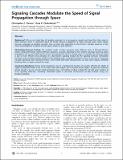Signaling cascades modulate the speed of signal propagation through space
Author(s)
Govern, Christopher C.; Chakraborty, Arup K.
DownloadGovern-2009-Signaling cascades m.pdf (317.5Kb)
PUBLISHER_CC
Publisher with Creative Commons License
Creative Commons Attribution
Terms of use
Metadata
Show full item recordAbstract
Background
Cells are not mixed bags of signaling molecules. As a consequence, signals must travel from their origin to distal locations. Much is understood about the purely diffusive propagation of signals through space. Many signals, however, propagate via signaling cascades. Here, we show that, depending on their kinetics, cascades speed up or slow down the propagation of signals through space, relative to pure diffusion.
Methodology/Principal Findings
We modeled simple cascades operating under different limits of Michaelis-Menten kinetics using deterministic reaction-diffusion equations. Cascades operating far from enzyme saturation speed up signal propagation; the second mobile species moves more quickly than the first through space, on average. The enhanced speed is due to more efficient serial activation of a downstream signaling module (by the signaling molecule immediately upstream in the cascade) at points distal from the signaling origin, compared to locations closer to the source. Conversely, cascades operating under saturated kinetics, which exhibit zero-order ultrasensitivity, can slow down signals, ultimately localizing them to regions around the origin.
Conclusions/Significance
Signal speed modulation may be a fundamental function of cascades, affecting the ability of signals to penetrate within a cell, to cross-react with other signals, and to activate distant targets. In particular, enhanced speeds provide a way to increase signal penetration into a cell without needing to flood the cell with large numbers of active signaling molecules; conversely, diminished speeds in zero-order ultrasensitive cascades facilitate strong, but localized, signaling.
Date issued
2009-02Department
Massachusetts Institute of Technology. Department of Biological Engineering; Massachusetts Institute of Technology. Department of Chemical Engineering; Massachusetts Institute of Technology. Department of ChemistryJournal
PLoS ONE
Publisher
Public Library of Science
Citation
Govern CC, Chakraborty AK (2009) Signaling Cascades Modulate the Speed of Signal Propagation through Space. PLoS ONE 4(2): e4639. doi:10.1371/journal.pone.0004639
Version: Final published version
ISSN
1932-6203